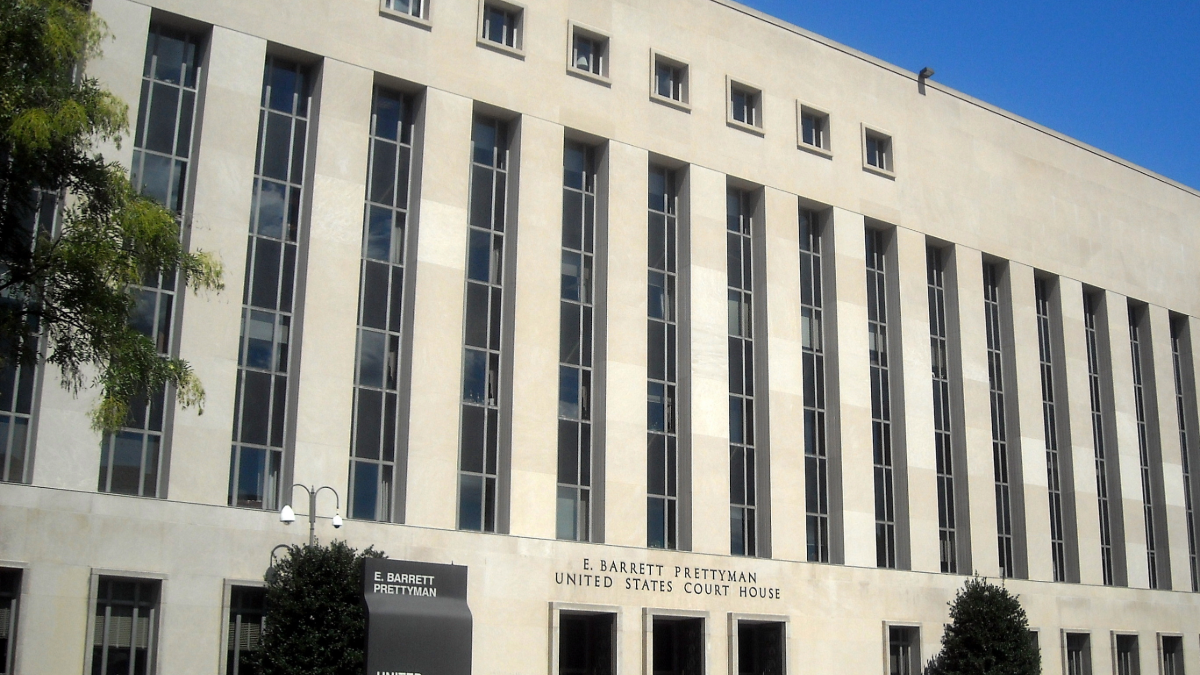TikTok Loses Appeal on Challenge to Law Requiring its Sale
Ben Lennett / Dec 6, 2024
The E. Barrett Prettyman Federal Courthouse. (Wikimedia)
Today, the US Court of Appeals for the District of Columbia concluded that legislation requiring ByteDance to divest TikTok “survive[s] constitutional scrutiny.” The legal challenge to the Protecting Americans From Foreign Adversary Controlled Applications Act (H.R. 7521) was brought by TikTok Inc. and ByteDance, as well as a group of TikTok creators. The parties challenged the constitutionality of the Act that gives TikTok’s China-based parent company, ByteDance, up to a year to sell the company or face a ban from app stores in the US.
The act was originally introduced in March 2024 by top lawmakers on the House Select Committee on the Chinese Communist Party, Reps. Mike Gallagher (R-WI) and Raja Krishnamoorthi (D-IL). The bill’s stated aim was to “protect the national security of the United States from the threat posed by foreign adversary controlled applications, such as TikTok” or any other product developed or provided by ByteDance. The Energy and Commerce Committee argued that the bipartisan legislation would prevent foreign adversaries, like the Chinese Communist Party (CCP), from “targeting, surveilling, and manipulating the American people through applications, like TikTok.”
The bill was later attached to a national security and foreign aid spending bill that included funding for Ukraine and Israel. The bill's language was amended to give ByteDance up to nine months to sell its stake in TikTok, with the option for an additional 90-day extension by the President, compared to six months in the earlier legislation. The bill passed the House and Senate in a matter of days, and the law was signed by the President in April 2024.
TikTok filed a complaint in May 2024 challenging the law, arguing that the "qualified divestiture" required by the act is "not possible: not commercially, not technologically, not legally. And certainly not on the 270-day timeline required..." Moreover, the law is an "extraordinary and unconstitutional assertion of power" that "circumvent[s] the First Amendment by invoking national security." It also argued that in "contrast with past enactments that sought to regulate constitutionally protected activity, Congress enacted these extreme measures without a single legislative finding."
Oral arguments in the case were held in September 2024. During the discussion, TikTok’s counsel emphasized First Amendment arguments, asserting that the law should be subject to strict scrutiny, a standard that the government cannot meet since it is based on “the possibility of future Chinese control” rather than any current threat. Its counsel further argued that even if TikTok were owned by a Chinese company and its content moderation decisions were being made abroad, the law would still suppress US users’ right to free expression. Similarly, counsel for a group of TikTok creators stressed that the First Amendment protects “working with the publisher and editor of our choice, including the current ownership.”
In contrast, the US government focused its argument on a data security rationale, emphasizing the sensitive data TikTok collects from its American users. The government claimed that the data could be “extremely valuable” to a foreign adversary seeking to influence Americans’ views or exploit them as an intelligence asset and asserted the law as having “nothing to do with protected speech by American citizens.”
The Court of Appeals largely agreed with the government, finding “the Act’s divestment mandate survives a First Amendment challenge.” Although it did acknowledge the “significant interests at stake on all sides,” including the “[s]ome 170 million Americans use TikTok to create and view all sorts of free expression and engage with one another and the world.” However, as the decision notes, “precisely because of the platform’s expansive reach, Congress and multiple Presidents determined that divesting [TikTok] from [China’s] control is essential to protect our national security.”
Free-expression advocates disagreed with the Court. “This is a deeply misguided ruling that reads important First Amendment precedents too narrowly and gives the government sweeping power to restrict Americans’ access to information, ideas, and media from abroad,” said Jameel Jaffer, the Knight First Amendment Institute’s executive director.
The decision is likely to be appealed by TikTok and the other plaintiffs to the US Supreme Court, or they could ask for an en banc review of the decision by the appeal court's entire panel of judges rather than just the three that decided the case. President-elect Trump sought a US ban of TikTok during his first term, but during the campaign, pledged to save it. The incoming President may have some discretion on how strongly to enforce the bill. Congress could also decide to repeal it. “If the Supreme Court does not step in, the next administration must immediately work with Congress to fix or repeal this flawed legislation,” said Jenna Leventoff, senior policy counsel at the ACLU.
Further Reading
- Eight Notable Themes from US Court of Appeals Oral Arguments In Challenge to TikTok Law
- Transcript: TikTok Inc. v. Merrick Garland Oral Arguments in the DC Court of Appeals
- Key Questions in the US Government’s Case Against TikTok
- TikTok Sues US Over Law That Would Force Its Sale
- TikTok Tug-of-War: Policymakers Conflicted Between Open Internet and Regulatory Control
- ByteDance Blew It With Epic TikTok Lobbying Own Goal
- Is TikTok an Early Casualty of the China-US AI "Cold War"?
- The US Government Must Show Its Cards on TikTok
- Transcript: TikTok, National Security, and the First Amendment
- Tracker: What US Senators Are Saying About TikTok Legislation
Authors
